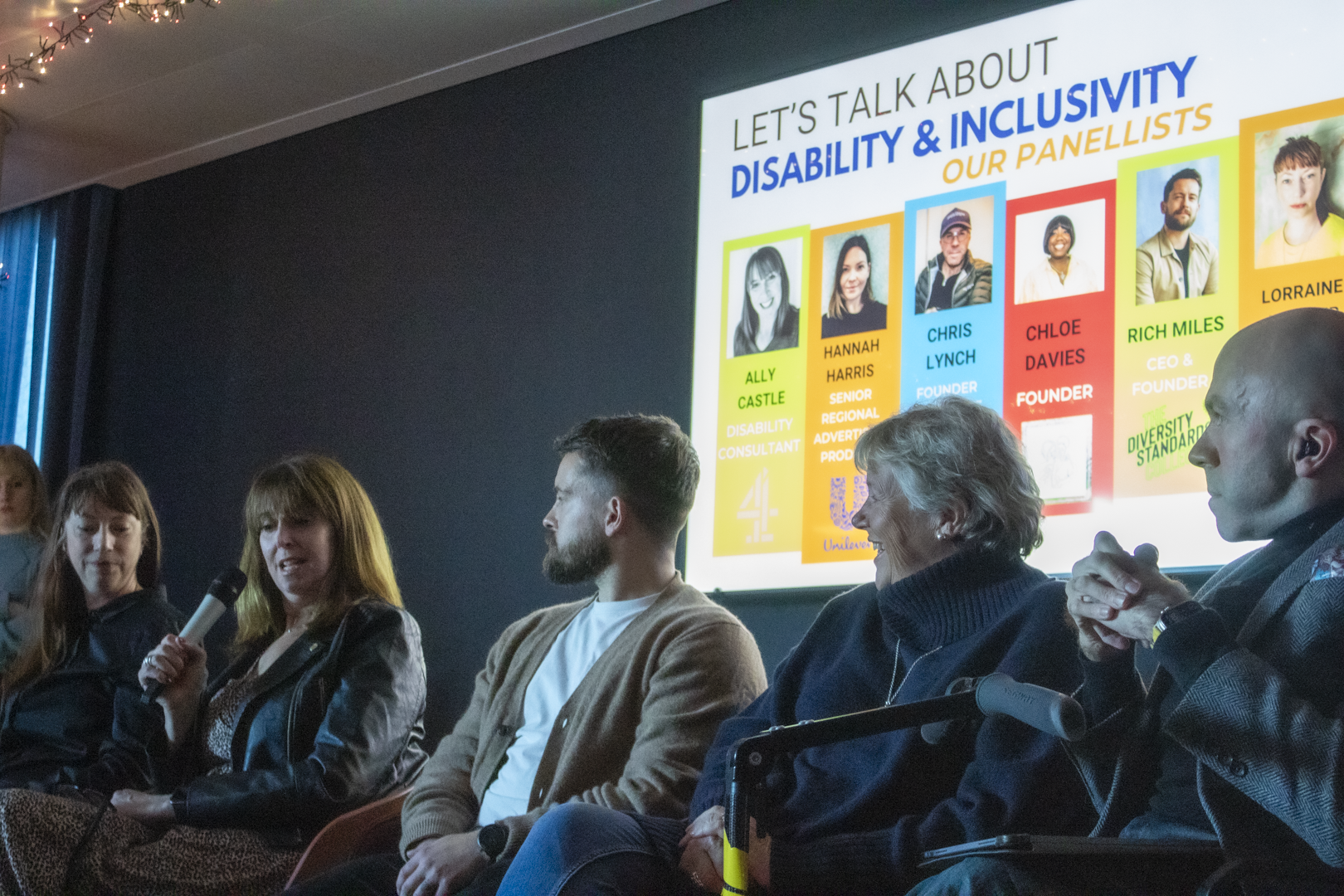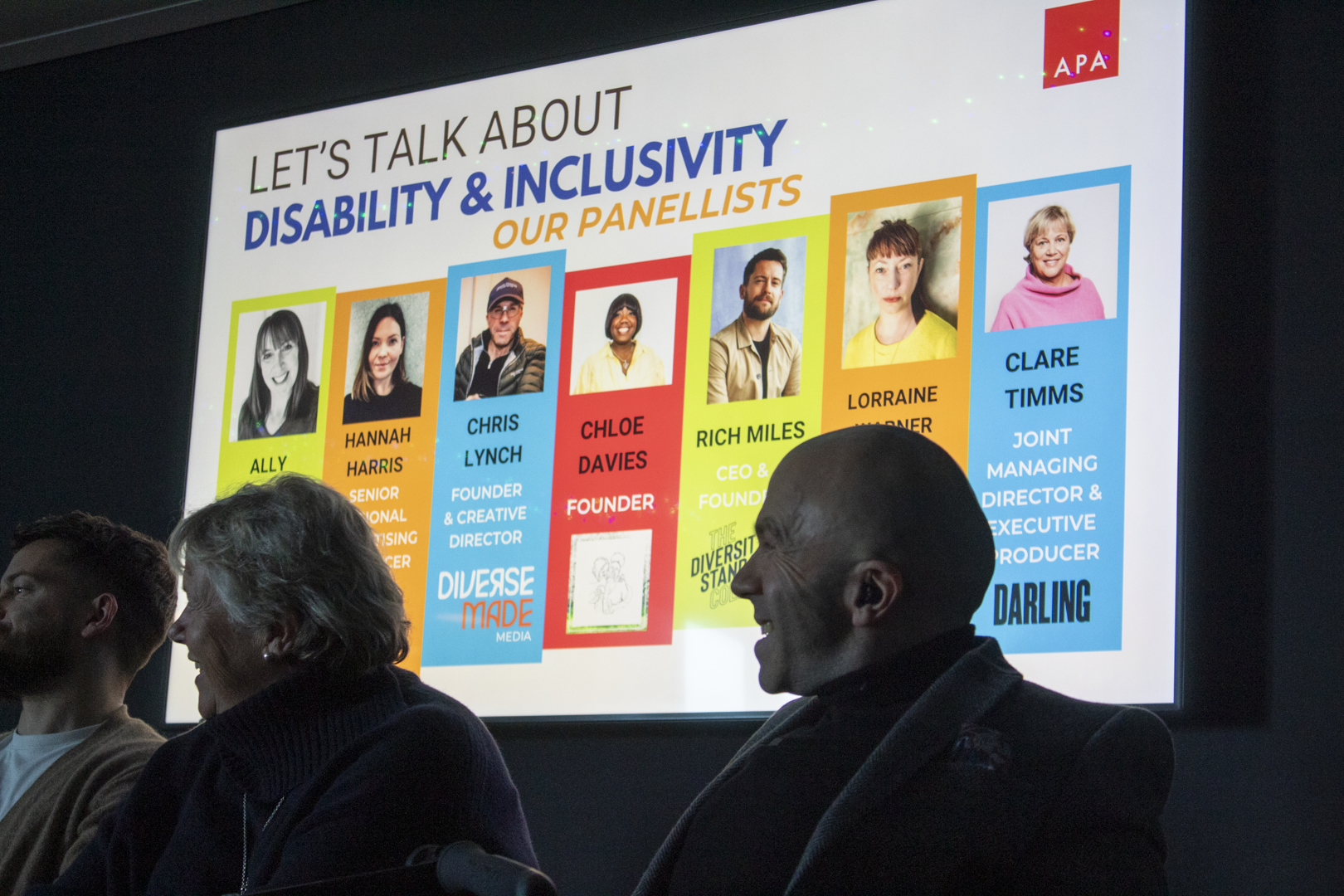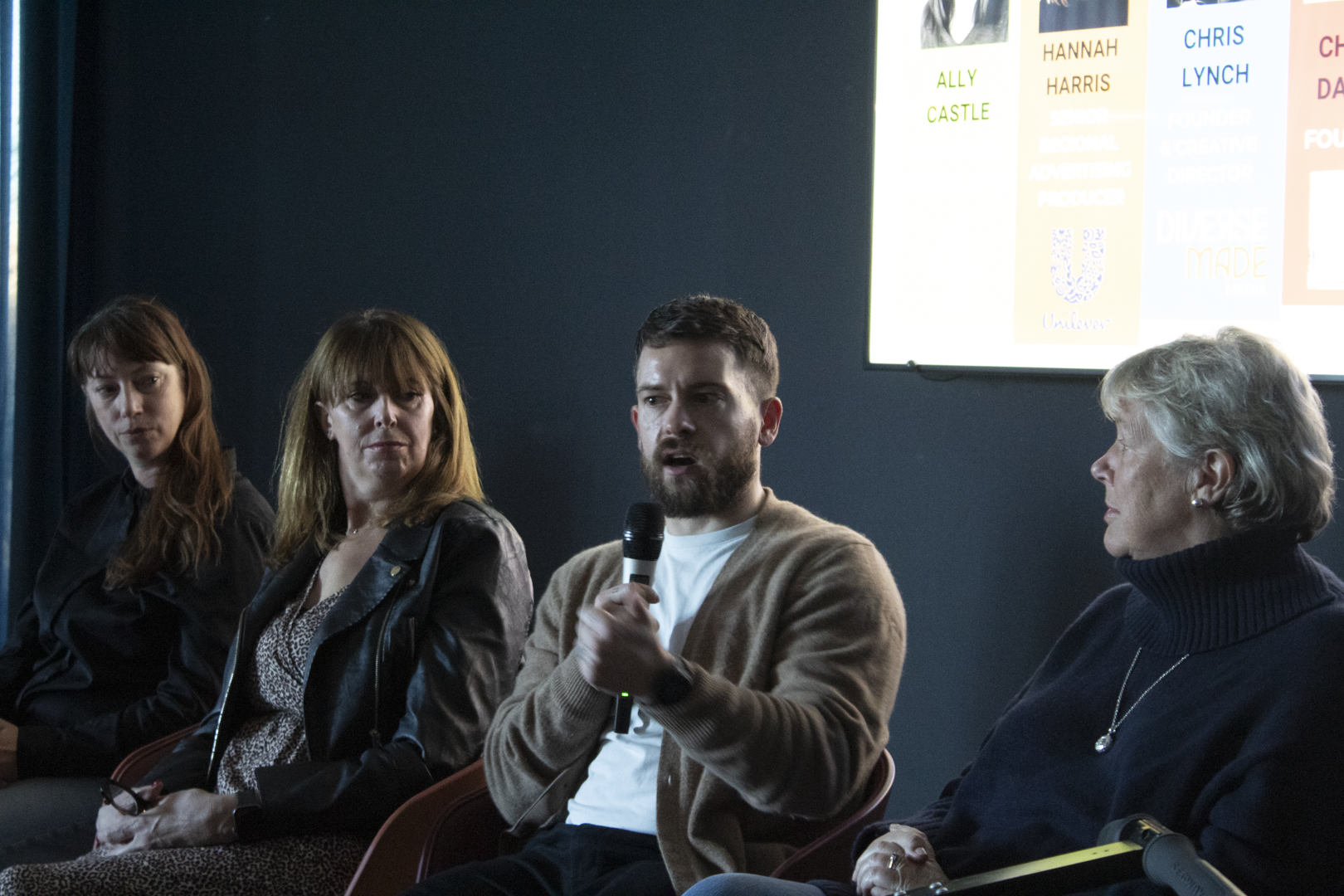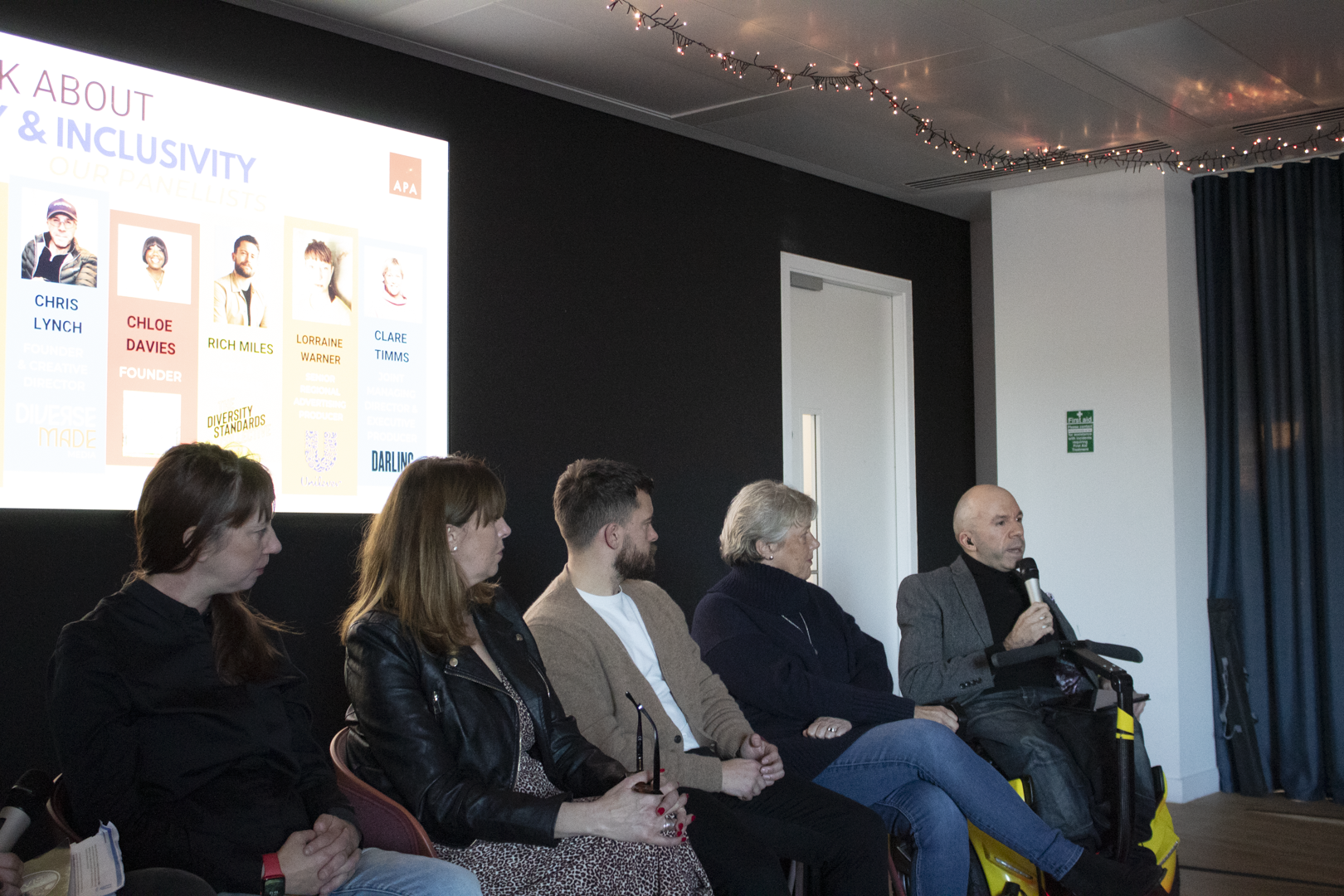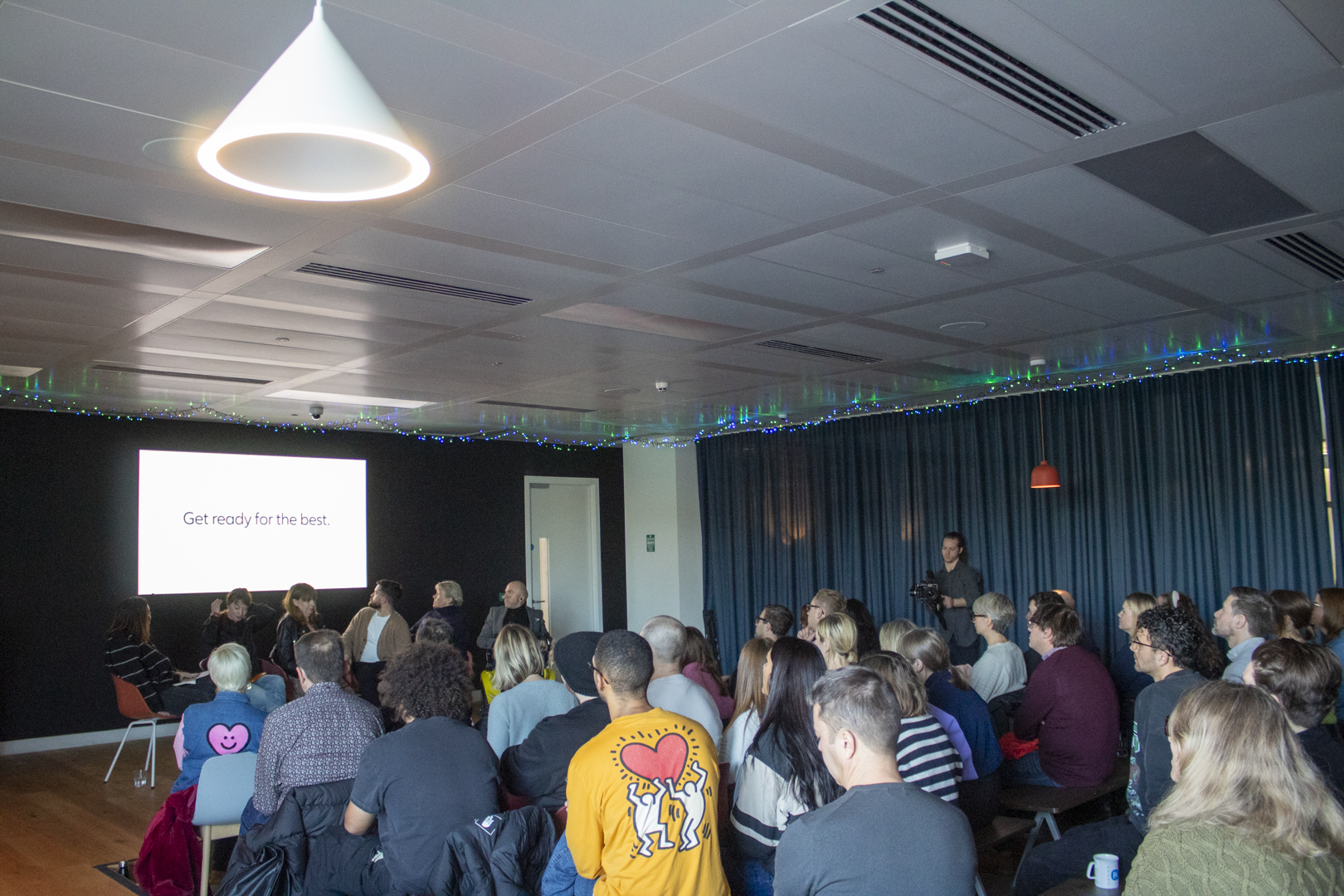Recap: ‘Disability Inclusivity in Production’ Panel Talk | A Collaboration with Unilever
Posted in D&I, Events, tagged with Diversity & Inclusion, Events, on December 6, 2023
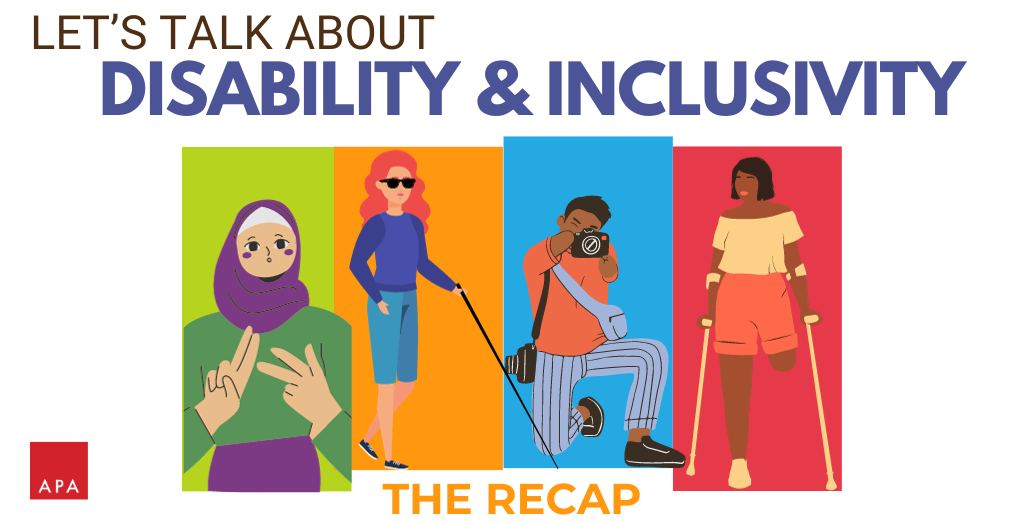
Breaking Barriers: A Panel Discussion on Disability Inclusivity in Production
In a recent panel discussion on disability inclusivity in production, industry experts convened to discuss Unilever’s Inclusive Set Commitment which will see Unilever covering the costs for one mentee from the disability community on every Unilever production valued at over €100K.
The panel also discussed the opportunities and challenges facing individuals with disabilities in the production industry. The talk, facilitated by Chris Lynch, Founder & Creative Director at Diverse Made Media, brought together professionals from various backgrounds within advertising and production. This summary recaps the key insights shared during the discussion.
Panellists:
Chris Lynch | Founder & Creative Director at Diverse Made Media
Ally Castle | Disability Consultant at Channel 4
Rich Miles | CEO & Founder at Diversity Standards Collective
Lorraine Warner | Senior Regional Advertising Producer at Unilever
Hannah Harris | Senior Regional Advertising Producer at Unilever
Clare Timms | Joint Managing Director & Executive Producer at Darling Films
Introducing Unilever’s Inclusive Set Commitment:
Lorraine and Hannah outlined Unilever’s commitment to disability inclusion. Acknowledging the stark disparity in disability representation, they introduced Unilever’s Inclusive Set Commitment, aiming to create access and opportunities for disabled people in the industry.
To access the Commitment, which has been in place for one year, or if you have any additional questions, please contact [email protected].
Please see links below for:
- The Inclusive Production Toolkit: A Guide for Authentic Inclusion Behind the Camera
- Accessibility & Participation Plan
Setting the Tone for Inclusivity: The Power of Declarations
The panel conversation commenced with an acknowledgement from Chris Lynch about the increasing awareness of disability inclusion in the industry. The panellists delved into the evolving landscape and the commitment to bridging diversity gaps.
Clare Timms shared insights from a recent shoot in Serbia, underscoring the need for enhanced training, and she also recounted a positive experience with a young boy facing challenges with his mental health and Tourette’s. Clare emphasised the crucial role of nurturing talent in order to see retention levels rise across the industry.
Neurodiversity Perspective:
Rich Miles provided a neurodiverse perspective, drawing on his experiences with ADHD. He highlighted the necessity for a cultural shift in the industry’s mindset, moving beyond numerical diversity goals to tangible and inclusive practices. Rich detailed DSC’s research initiatives, including collaborations with Unilever which highlighted that the most asked question during their surveys to production reps was ‘what are the biggest adaptations that people can make on set’ and actually, the biggest response from disabled individuals or for most people was their attitude and mood, making sure everyone is doing well, and being considerate of the difficulties they go through on a daily basis. Ally provided a great example:
“When someone walks in the office, they’ve probably had about 10 annoying things happen to them already. And then they’re thinking about how they are going navigate the rest of their day. So, just have that patience and understanding that there’s a lot going on, emotionally and physically, to navigate a world that is not built for you.”
Television’s Role in Disability Inclusion:
Ally, with over 20 years in television, discussed her involvement in the TV Access Project. She emphasized broadcasters’ commitment to fund access costs outside production budgets, with a goal of full industry inclusion by 2030. Ally highlighted the legal duty to provide necessary adjustments for individuals with disabilities, urging the industry to prioritise accessibility, and also mentioning how accessibility enables a smoother operation for not only disabled people but for everyone. One example was:
“Disabled people will practically save the world because the innovations that have to happen for inclusion are actually better for everyone. The classic example is the cobbles on Coronation Street. Sharon Houston, who’s one of the actors on the show ‘Coronation Street’, lobbied for ages because of her struggle to get around with her wheelchair. And now they’ve got smooth access around the outside the cobbles and all the crew are saying ‘this is bloody brilliant for getting my kit around!’”
Challenges and Opportunities:
The panel explored the challenges associated with disability inclusion, particularly addressing cost concerns. Clare Timms emphasised the need for a change in mindset, acknowledging that while adjustments may incur additional expenses, the benefits of inclusive practices far outweigh the costs. The importance of open conversations, asking questions, and proactive efforts in creating accessible environments were collectively emphasised.
Ally then shared insights into the Access to Work scheme, a government-funded initiative providing support for individuals with disabilities on set. The panel also discussed Unilever’s Industry Inclusive Toolkit, offering practical advice and frameworks for inclusive practices.
Key Takeaways and Top Tips:
The panel concluded by offering key takeaways and practical tips for industry professionals:
- Promote Open Conversations: Encourage open dialogue about disability by ensuring you provide a safe space for your crew to come to you with their proposed changes and needs that increase accessibility.
- Utilise Available Resources: Explore initiatives like Access to Work and leverage industry toolkits and resources, such as APA’s D&I resources (detailed below) and Unilever’s Industry Inclusive Toolkit, for practical guidance.
- Prioritise Training: Invest in training programmes to enhance industry-wide awareness and understanding of disability inclusion.
- Commit to Tangible Change: Move beyond numerical goals and commit to tangible, inclusive practices.
- Embrace Diversity of Thought: Recognise the creative contributions of individuals with disabilities and leverage diverse perspectives.
- Regularly Assess Needs: Continuously assess and address the evolving needs of individuals with disabilities on set.
The panel discussion provided valuable insights into the progress, challenges, and collective responsibility to foster a more inclusive and diverse production landscape. The shared insights serve as a call to action for industry leaders and professionals to actively contribute to breaking down barriers and promoting equal opportunities for individuals with disabilities in the world of advertising and production.
APA members have consistently demonstrated their commitment to fostering disability inclusion and we will continue to support your D&I goals through the APA resources below, as well as some other links:
- APA Initiative Directory provides you with programmes, organisations and resources that will help you to access a more diverse workforce, and to help provide opportunities for those currently underrepresented in production. You can filter by motivation e.g., Disability Equity, Mental Health etc., and you can also find Ally Castle’s creative strategy consultancy, Ideally, listed under Consultancy.
- APA Talent Resources which includes organisations such as The Kusp, Zebedee Talent, and Exceptional Individuals.
- APA Wellbeing Directory is aimed at supporting our members, their employees and crew, MDs and owners. Find a mixture of companies which offer wellbeing services that you can implement within your company, along with independent registered therapists, councillors, and life coaches. When contacting any of the companies below, please quote the APA and they will tailor the service to your company’s needs, size and budget.
- APA member, Annex, worked with Merkel B2B to produce a campaign for Irwin Mitchell. Annex strived to make the set as inclusive as possible, particularly regarding differently abled crew. Here is a film they made about the process, which could provide more insights for you.
- Diverse Made Media: Allianz x Paralympic BTS (won Bronze Clio award).
- Diverse Made Media camera system which supports the accessibility needs of disabled crew. Learn more about it and how you can support here.
- Film London have launched the Equal Access Network to ensure London’s screen industries represent the city itself, and to make the industry more accessible to all. Find out more.
- Guidance on Inclusive language: words to use and avoid when writing about disability. Remember, no community is a monolith so preferred terms of use will vary.
